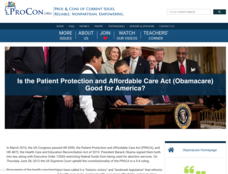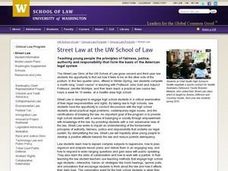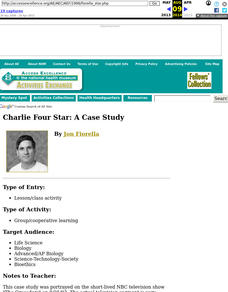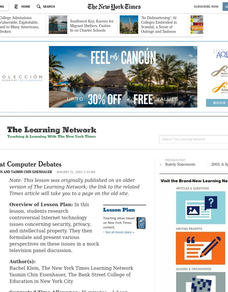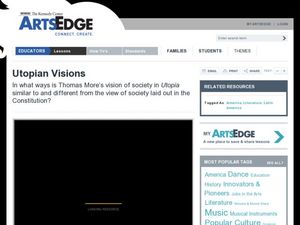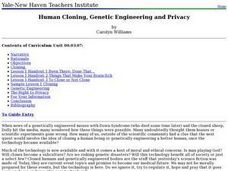National First Ladies' Library
States' Rights: 1798-1860
Students develop an annotated timeline specific to the concept of States' Rights. They research an example to the doctrine noting how the ideas change and beome more specific as time passes and discuss their findings through class...
National Endowment for the Humanities
Ratifying the Constitution
Ratifying the Constitution was no simple task. Using primary sources, such as classic writings from the Federalists and Anti-Federalists, young scholars examine the arguments for and against the Constitution. They then decide: Would they...
Stanford University
Beyond Vietnam
On April 4, 1967 Martin Luther King, Jr. delivered his speech "Beyond Vietnam." The controversy that followed is the focus of a three-lesson unit that asks class members to consider the political and social implications of King's stance.
ProCon
Obamacare
Former President Barack Obama reformed the United States' health care system with Obamacare, but is the new legislation good for America? Scholars read a historical timeline about the passage of health care reform laws and compare United...
ProCon
Drinking Age
Eighteen is the age of adulthood in the United States, but 21 is the legal drinking age. Pupils use the provided website to determine whether the age to legally purchase and consume alcohol should be lowered. They weigh the pros and...
Curated OER
Promoting the Common Good
Students participate in a service learning activity regarding universal human rights. In this service learning lesson, students craft posters that illustrate guaranteed rights that all people should possess.
Curated OER
Individual Rights and Liberties: Free Speech
Students review free speech laws and the First Amendment in the Constitution. They discuss a current event involving free speech. They present the information to the class.
Curated OER
Right of Privacy: 4th Amendment
Learners are introduced to the 4th Amendment of the Washington state Constitution. In groups, they examine the Constitution of the state of Washington and compare it to the United States Constitution. They role play the role Supreme...
Curated OER
Charlie Four Star: A Case Study
Engage in a class debate dealing with the allocation of organs to those waiting for a transplant. How do they decide who gets a transplant and who doesn't? Learners attempt to determine what is fair for the individual requiring an organ...
Facing History and Ourselves
The Power of Images
One picture but a thousand stories. As a part of a case study of how the death of Michael Brown was reported by professional news sources and on social media class members examine the reactions of various groups to a photograph taken by...
Deliberating in a Democracy
Cloning
High schoolers explore the issues and challenges of cloning. In this cloning lesson plan, students read about how cloning affects people and the types of cloning, then they prepare a debate either for or against cloning.
Curated OER
The Great Computer Debates
Students research controversial Internet technology issues concerning security, privacy, and intellectual property. They formulate and present various perspectives on these issues in a mock television panel discussion.
National Endowment for the Humanities
NAACP’s Anti-Lynching Campaign in the 1920s
Learners investigate the anti-lynching campaign of the NAACP in the 1920's. In this human rights instructional activity, students prepare for and participate in a simulated debate of the Dyer Anti-Lynching Bill that was presented to...
Curated OER
What is Meant by Returning to Fundamental Principles?
Students explain in what ways the American experience in self-government can be called an adventure in ideas. They evaluate positions on a number of issues related to the fundamental principles and values of government and individual...
Curated OER
Animal Testing
Animal testing: cruel and inhumane, or innovative and life-saving? Scholars explore the topic and form their own opinions with help from the highly informative website. Pupils read a comprehensive overview of the topic, including...
Curated OER
Utopian Visions
Students examine Sir Thomas More's Utopian vision. In this philosophy lesson, students read Utopia and determine the pros and cons of Utopian societies. Students then create and present monologues of residents of the Utopia.
Curated OER
Sharing Or Stealing? Debating the Ethics of Napster
Students debate ethics of free Internet file-sharing of copyrighted materials.
Curated OER
A Lesson To Accompany "The First Bank of the United States: A Chapter in the History of Central Banking"
Here is an interesting topic. Learners examine the economics that led to the founding of the First Bank of America. They participate in a reader's theater experience depicting the debate between Alexander Hamilton and Thomas Jefferson...
Deliberating in a Democracy
Juvenile Justice
Pupils compare and contrast the legal system as it pertains to juvenile and adult crime and punishment. Incorporating primary documents, legal decisions, and video evidence, individuals form an argument debating the treatment of...
Deliberating in a Democracy
National Service
Uncle Sam wants you to serve! Scholars investigate the role of mandatory national service in an open democracy. They research, watch a video, and hold a debate surrounding the issue of requiring one year of service to gain a better...
Deliberating in a Democracy
Cyberbullying—Lesson Plan
Learners examine cyberbullying. In this lesson on democracy, students discuss the different ways to deal with cyberbullying. They then take a position on the question of whether a democracy should allow schools to take action against off...
Curated OER
Why Do Governments Exist? Locke, Hobbes, Montesquieu, and Rousseau
Here is a great secondary source reading that includes the primary ideas and philosophies of the famed Enlightenment philosophers: Thomas Hobbes, John Locke, Charles Montesquieu, and Jean-Jacques Rousseau. In additional to discussing...
Curated OER
Human Cloning, Genetic Engineering and Privacy
Review the aspects of human cloning and the moral issues associated with it. Individually, your students will keep a list of the articles related to this issue and research issues related to the ethic issues people are concerned with....
Constitutional Rights Foundation
Naturalized Citizens and the Presidency
Article II, Section 1 of the U.S. Constitution takes center stage in a instructional activity that asks class members to assume the role of state senators, debate a resolution to amend the U. S. Constitution to permit naturalized...





